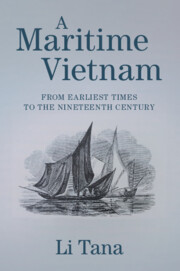Book contents
- A Maritime Vietnam
- Dedication
- A Maritime Vietnam
- Copyright page
- Contents
- Figures
- Maps
- Tables
- Preface
- Introduction
- 1 Maritime Formations
- 2 Aromatics, Buddhism, and the Making of a South Seas Emporium
- 3 ‘THE Harbour and THE Path of All Countries’
- 4 Maritime Resurgence and the Rise of Dai Viet
- 5 Winds of Trade from the Middle East
- 6 Muslim Trade and the Conquest of the Coast
- 7 Silks and Society
- 8 Seventeenth-Century Dang Trong
- 9 The Rise and Fall of the Eighteenth-Century Water Frontier
- 10 Ships and the Problem of Political Integration
- Conclusion
- Bibliography
- Index
3 - ‘THE Harbour and THE Path of All Countries’
Linyi, 200–700 ce
Published online by Cambridge University Press: 12 January 2024
- A Maritime Vietnam
- Dedication
- A Maritime Vietnam
- Copyright page
- Contents
- Figures
- Maps
- Tables
- Preface
- Introduction
- 1 Maritime Formations
- 2 Aromatics, Buddhism, and the Making of a South Seas Emporium
- 3 ‘THE Harbour and THE Path of All Countries’
- 4 Maritime Resurgence and the Rise of Dai Viet
- 5 Winds of Trade from the Middle East
- 6 Muslim Trade and the Conquest of the Coast
- 7 Silks and Society
- 8 Seventeenth-Century Dang Trong
- 9 The Rise and Fall of the Eighteenth-Century Water Frontier
- 10 Ships and the Problem of Political Integration
- Conclusion
- Bibliography
- Index
Summary
Chapter 3 shows that Linyi kingdom occupied the key relay position in the longest chain of transshipment relays in the world at the turn of the first millennium. It became the most fully Indianised kingdom among all other Southeast Asian countries by the sixth century CE despite its close ties with Chinese courts and markets. Its wide networks built itself a wealthy society along the central coast and its existence proved vital to the prosperity of Jiaozhou under the Chinese rule. The flow of commercial wealth that Linyi generated changed political equations in the Tongking Gulf. Linyi rested on control of two key resources: strategic harbours for ports of call and the aromatic forests of the interior liked by well-established overland trails. These two factors would constitute the economic base of this important polity on the central coast between China and other Southeast Asian neighbours. Linyi did not collapse so much as fade away to re-emerge in part as Champa.
- Type
- Chapter
- Information
- A Maritime VietnamFrom Earliest Times to the Nineteenth Century, pp. 80 - 109Publisher: Cambridge University PressPrint publication year: 2024

